For over a decade there was no debate. If you wanted the smoothest, most polished mobile operating system, you bought an iPhone. iOS was fluid, reliable, beautifully walled off. Android, by comparison, felt like the wild west. Powerful, yes, but messy, fragmented, and a little rough around the edges.
But times change. And if you’ve picked up a high-end Android phone lately, you’ll know the gap has closed.
In some ways, it may have flipped.
Apple built its empire on refinement, not raw experimentation. iOS didn’t need to be flashy. It just needed to work. And for years, that was enough to keep millions of users locked in the garden, happy to pay premium rent.
But as Android matured, its roughness gave way to flexibility, innovation, and raw AI horsepower. Where iOS stayed familiar, Android evolved. Features that once felt gimmicky, like split-screen multitasking, smarter notifications, and deep customisation, are now standard.
Which raises the question. Is Apple still leading, or just maintaining?
The AI Shift Apple Missed
The last year has made it brutally clear that AI isn’t just another feature. It’s the platform.
Google’s Gemini is already woven into Android in ways that feel seamless. Real-time translation, image recognition, predictive text that actually predicts. These are things users can feel. Apple, meanwhile, promised “Apple Intelligence”… and then didn’t deliver. Or at least, not yet.
If you care about AI today, the iPhone may no longer be the obvious choice. And that’s a sentence nobody thought we’d be writing even two years ago.
Of course, Apple still has its fortress. The ecosystem is unmatched. iMessage, AirDrop, the App Store, and security that actually feels like security. It’s the glue that keeps users locked in place.
But didn’t BlackBerry say the same thing once? For years its messaging platform and encryption were “too vital to fail”. And yet it failed. Today BlackBerry Messenger is just a pub quiz answer.
The question is whether Apple is innovating fast enough, or simply betting that the walls of its garden are high enough to keep everyone inside.
So here’s the question worth asking. Would you switch?
If you’re an iPhone loyalist, what keeps you there. The hardware, the ecosystem, the polish?And if you’re on Android, do you ever look over the wall and wonder if you’re missing something?
The lines aren’t clear anymore. For many it isn’t about status or polish. It’s about what actually gets things done.
The next five years won’t be about apps. They’ll be about assistants. About which phone feels less like a tool and more like a co-pilot. If Apple manages to pull off its own AI integration, it could reclaim the crown through sheer ecosystem gravity. But if it continues to stall, Android’s open, experimental playground may become the place where the future really happens.
iOS was once the future everyone wanted. Now the future feels like it’s leaning Android’s way.

